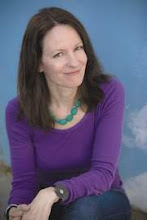The essential question for point of view: Who is telling the story?
Narrative point of view is about perspective. Through whose perspective or “consciousness” is the story viewed?
 Besides the first person, "I"--which everyone seems to start out with-- there's first person plural, "we," and second person, "you." And third person "close," where we have access to the thoughts of one character. Third person omniscient is what I'm most interested in exploring, especially because not enough writers use it. Or don't start using it early enough...it is a "mature writer's technique," as Richard Russo mentions in his fabulous essay, "in Defense of Omniscience."
Besides the first person, "I"--which everyone seems to start out with-- there's first person plural, "we," and second person, "you." And third person "close," where we have access to the thoughts of one character. Third person omniscient is what I'm most interested in exploring, especially because not enough writers use it. Or don't start using it early enough...it is a "mature writer's technique," as Richard Russo mentions in his fabulous essay, "in Defense of Omniscience."In Praise of the Narrator as Storyteller...with authority. And wit. And inside knowledge.
I love that witty know-it-all narrator in omniscient POV, the storyteller who takes you by the hand with authority, and leads you into the story.[ Or perches with you in the front row to watch the drama, or settles in for court-side seats.] The narrator who judges, predicts, warns, praises, moves back and forth in time.
This kind of narrator:
"It is a truth universally acknowledged, that a single man in possession of a good fortune, must be in want of a wife." -- Jane Austen, Pride and Prejudice
Debra Spark's essay, "Stand Back," from Curious Attractions: Essays on Fiction Writing, University of Michigan Press is immensly helpful and a pleasure to read. I'll be quoting from Debra on this subject, too:
“. . .many contemporary narratives are written in first person or in a third person that's a virtual stand-in for the first person. [In that case,] the third-person narrator has access to a single consciousness and rarely uses his or her status as narrator to offer up much that a single consciousness wouldn't provide. Your narrator need not be your protagonist. Or you, for that matter. Distance can, in some cases-for some stories-be a good thing. And even when distance isn't advisable, it can't hurt to consider options for the narrator-character relationship.” –Debra Spark
Hub City Writers Conference and Bookshop Opening
There are still spaces available in fiction and non-fiction at the 10th annual Hub City Writing Conference July 30-Aug. 1 at Wofford College. This year's event features a keynote address by novelist Elizabeth Berg and Sunday morning panel session with representatives of small presses and literary magazines on the topic of "how to get published."
Published novelists, poets, essayists, and literary critics lead a series of workshops over three days that include intense instruction, challenging exercises, and an opportunity for feedback. To register, please visit www.hubcity.org/conference.







No comments:
Post a Comment